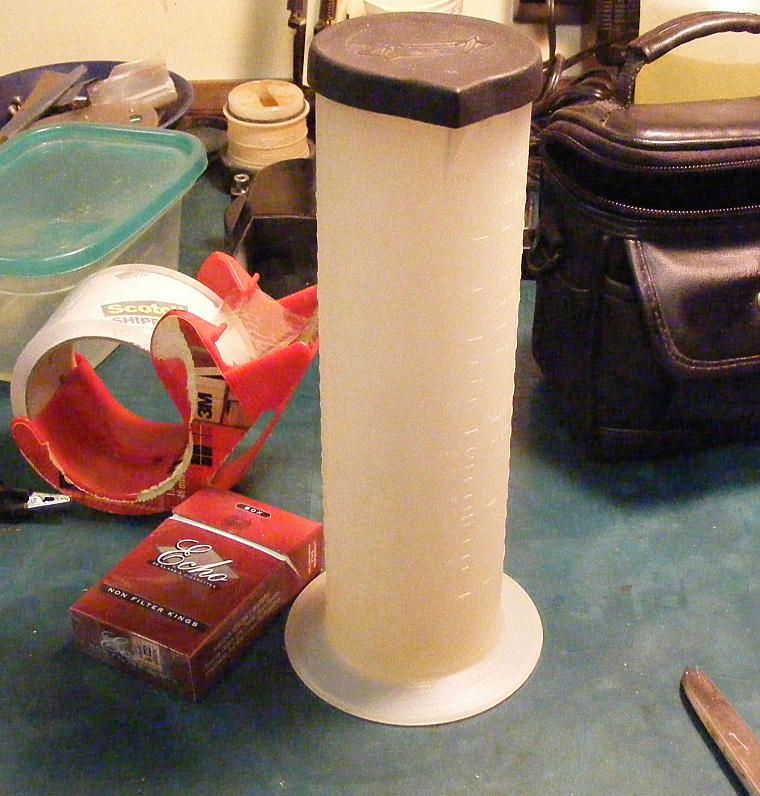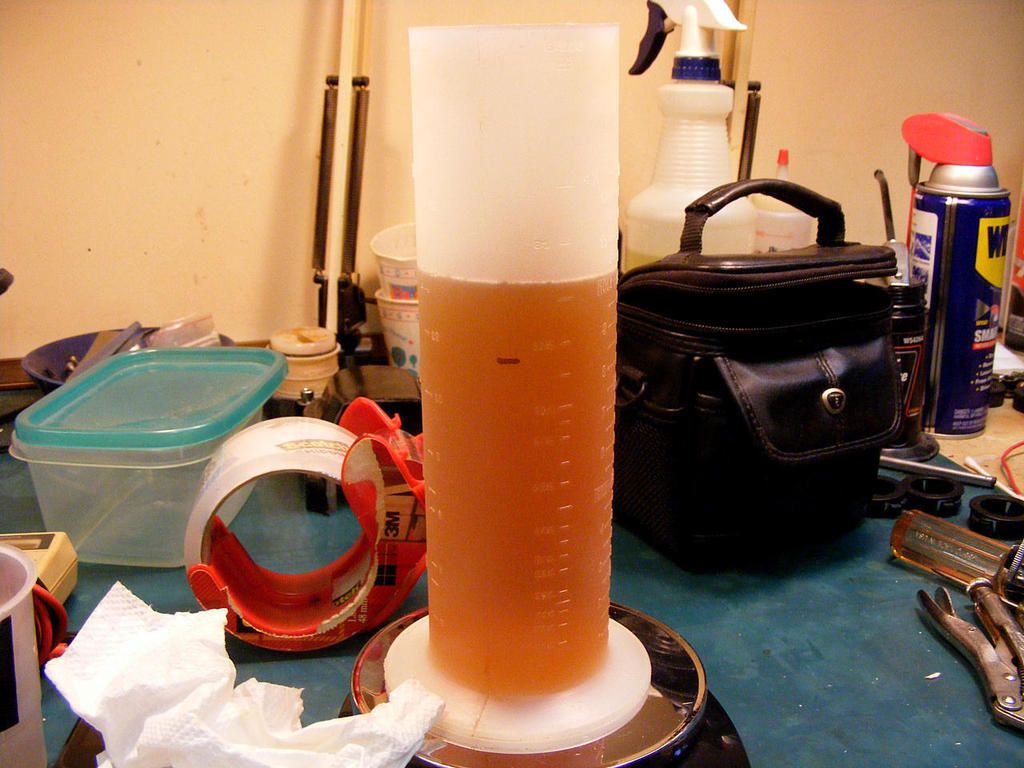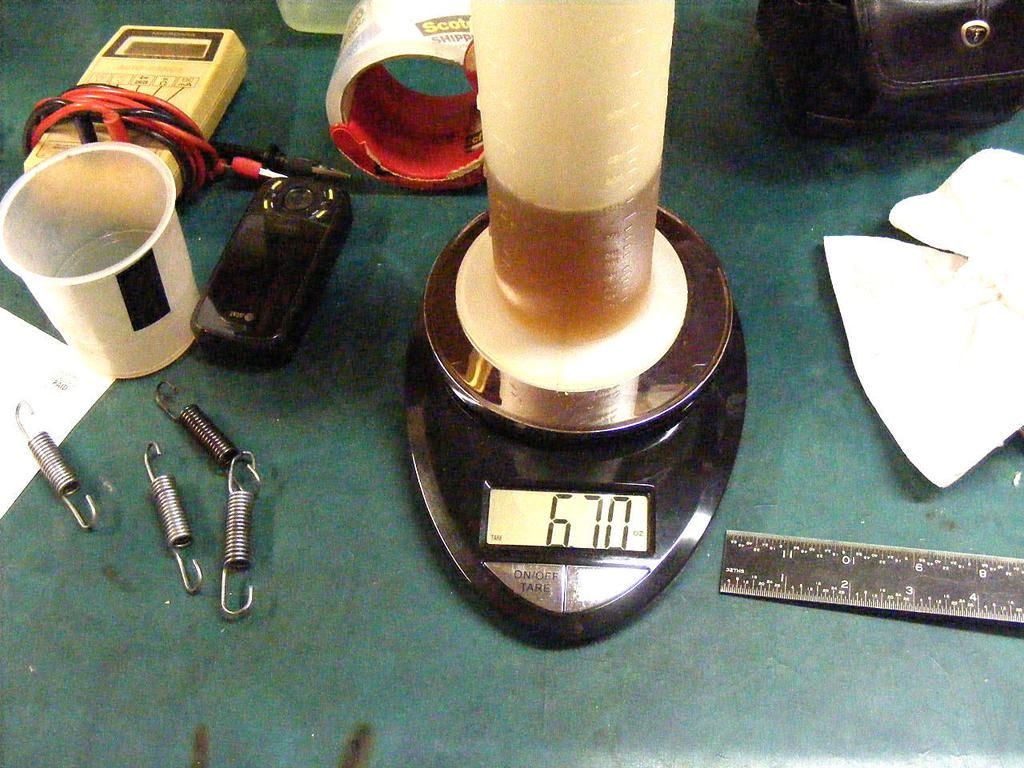
Graduated Cylinder
Moderators: oldjapanesebikes, H2RICK, diamondj, Suzsmokeyallan
- Coyote
- Moto GP
- Posts: 3404
- Joined: Tue Oct 21, 2008 2:41 pm
- Country: USA
- Suzuki 2-Strokes: GT550x2, GT750, GS1000
- Location: Tulsa, Oklahoma
Graduated Cylinder
Does anybody own one of these that you can actually read? If so, where did you get it? This is a POS.


I was born with nothing and still have most of it left.
.
1978 GS1000C
1976 GT550 ongoing money pit.
.
1978 GS1000C
1976 GT550 ongoing money pit.
- tz375
- Moto GP
- Posts: 6212
- Joined: Mon Nov 03, 2008 10:47 am
- Location: Illinois
Re: Graduated Cylinder
What are you using it for?
If it's for pre-mix there is only 1 way to do it and that's with an Accu-mix jug. I can't tell you how many I have bought and then given away to people. They are not cheap but they are absolutely the best way to mix fuel and oil - bar none.
If it's for pre-mix there is only 1 way to do it and that's with an Accu-mix jug. I can't tell you how many I have bought and then given away to people. They are not cheap but they are absolutely the best way to mix fuel and oil - bar none.
-
yeadon_m
- Road race school
- Posts: 792
- Joined: Sun Aug 05, 2012 1:18 am
- Country: UK
- Suzuki 2-Strokes: GT380B, GT550B, GT750A, GSX1400
Re: Graduated Cylinder
Mark the major graduations with a black Sharpie and its easy to judge the rest. Or, hold towards the light so the fluid is between your eyeline and the light. Mike
- Coyote
- Moto GP
- Posts: 3404
- Joined: Tue Oct 21, 2008 2:41 pm
- Country: USA
- Suzuki 2-Strokes: GT550x2, GT750, GS1000
- Location: Tulsa, Oklahoma
Re: Graduated Cylinder
I have had this for years. Basically for transmission filling and forks. This one is terrible. I can see the graduations only with my strongest glasses. You say OK then -- get your glasses. Even though there are lines and numbers on there, there is no indication as to what they are. Worse is the lines are barely discernible, even in the best of light. I tried the Sharpie before, but the surface is simply too rough.
Before this I had one that had a cup shape cylinder. It was clear plastic and the graduations were black. Clearly marked cc,ml,oz and so on. I dropped it and it cracked (leaking) so I trashed it. That was probably close to 15 years ago. Never found another one like it.
So now I use an electronic kitchen scale. It measures in ounces, pounds. grams and kilograms. I can zero it at any point. So I just calculate how much the fluid I need weighs. For instance the transmission holds 1500cc. That converts to 50.72 ounces. The tube doesn't hold that much, so I split it. 25 - 25.72. OR I'll add a quart and an additional 18.72 oz. Easy enough.
Before this I had one that had a cup shape cylinder. It was clear plastic and the graduations were black. Clearly marked cc,ml,oz and so on. I dropped it and it cracked (leaking) so I trashed it. That was probably close to 15 years ago. Never found another one like it.
So now I use an electronic kitchen scale. It measures in ounces, pounds. grams and kilograms. I can zero it at any point. So I just calculate how much the fluid I need weighs. For instance the transmission holds 1500cc. That converts to 50.72 ounces. The tube doesn't hold that much, so I split it. 25 - 25.72. OR I'll add a quart and an additional 18.72 oz. Easy enough.
I was born with nothing and still have most of it left.
.
1978 GS1000C
1976 GT550 ongoing money pit.
.
1978 GS1000C
1976 GT550 ongoing money pit.
- Alan H
- Moto GP
- Posts: 3250
- Joined: Thu Feb 16, 2012 11:50 am
- Country: England
- Suzuki 2-Strokes: 4 x GT550s - J, M, A, B.
- Location: The Republic of South Yorkshire
Re: Graduated Cylinder
To do it with a weighing scale isn't straightforward.
You need the specific gravity or weight per unit volume of what you are measuring for starters.
Water is 1 Kg per litre, oil varies a lot depending on type of course, so working it out isn't a simple task, just a PITA.
Look HERE for info.
Any kitchen supply shop will have good measuring jars which accurately measure by volume, not weight and should normally show in litres and pints. Or just 'borrow' one out of the kitchen when 'she' isn't at home, but wash and wipe it before she gets back as 'they' tend not to appreciate the taste of engine oil in cooking for some reason.
The KISS (Keep It Simple Stupid) principle is the easiest way to do ANYTHING.
You could be under or over filling gearbox/forks/whatever using a weighing scale.
For filling forks I use a large plastic syringe for very accurate measuring - available from pet shops or even better, veterinarians very cheaply as they use them once and throw them away.
You need the specific gravity or weight per unit volume of what you are measuring for starters.
Water is 1 Kg per litre, oil varies a lot depending on type of course, so working it out isn't a simple task, just a PITA.
Look HERE for info.
Any kitchen supply shop will have good measuring jars which accurately measure by volume, not weight and should normally show in litres and pints. Or just 'borrow' one out of the kitchen when 'she' isn't at home, but wash and wipe it before she gets back as 'they' tend not to appreciate the taste of engine oil in cooking for some reason.
The KISS (Keep It Simple Stupid) principle is the easiest way to do ANYTHING.
You could be under or over filling gearbox/forks/whatever using a weighing scale.
For filling forks I use a large plastic syringe for very accurate measuring - available from pet shops or even better, veterinarians very cheaply as they use them once and throw them away.
Think of how stupid the average person is, then realise that half of them are more stupid than that.
- Coyote
- Moto GP
- Posts: 3404
- Joined: Tue Oct 21, 2008 2:41 pm
- Country: USA
- Suzuki 2-Strokes: GT550x2, GT750, GS1000
- Location: Tulsa, Oklahoma
Re: Graduated Cylinder
foiled again  I'm going to test this. I will put 12 ounces of water in the column. Mark level with sharpie, drain and dry. Then put 12 ounces of oil in the column and see how much difference there is between the oil level and the mark made with water
I'm going to test this. I will put 12 ounces of water in the column. Mark level with sharpie, drain and dry. Then put 12 ounces of oil in the column and see how much difference there is between the oil level and the mark made with water
I was born with nothing and still have most of it left.
.
1978 GS1000C
1976 GT550 ongoing money pit.
.
1978 GS1000C
1976 GT550 ongoing money pit.
-
yeadon_m
- Road race school
- Posts: 792
- Joined: Sun Aug 05, 2012 1:18 am
- Country: UK
- Suzuki 2-Strokes: GT380B, GT550B, GT750A, GSX1400
Re: Graduated Cylinder
It will be quite a surprising difference - I'm guessing the oil may be 20-30% lighter than water of same volume.
If you've weighed out your oil (must say, a novel one on me) you may have as much as 1/3rd to great a volume in your gearbox and forks.
Mike
If you've weighed out your oil (must say, a novel one on me) you may have as much as 1/3rd to great a volume in your gearbox and forks.
Mike
- Coyote
- Moto GP
- Posts: 3404
- Joined: Tue Oct 21, 2008 2:41 pm
- Country: USA
- Suzuki 2-Strokes: GT550x2, GT750, GS1000
- Location: Tulsa, Oklahoma
Re: Graduated Cylinder
Holy sheet. According to this result, my tranny is way over full. I expected some difference, but not this much. Sharpie mark was 12 oz of water. Cylinder contains 12 oz motor oil. I don't think there is too much in the forks. I went by the 5.4 oz specified in the manual. No conversion. I am shocked 




I was born with nothing and still have most of it left.
.
1978 GS1000C
1976 GT550 ongoing money pit.
.
1978 GS1000C
1976 GT550 ongoing money pit.
- Coyote
- Moto GP
- Posts: 3404
- Joined: Tue Oct 21, 2008 2:41 pm
- Country: USA
- Suzuki 2-Strokes: GT550x2, GT750, GS1000
- Location: Tulsa, Oklahoma
Re: Graduated Cylinder
Now hold on. You guys had be scared for a minute. 1500cc of oil= 50.7oz of oil. If I am weighing the actual oil, how could I possibly be off?. It has nothing to with the difference in volume between oil and water.
That 1500cc is the volume of oil required. That volume of oil weighs 50.7 ounces. How could I possibly miss?
That 1500cc is the volume of oil required. That volume of oil weighs 50.7 ounces. How could I possibly miss?
I was born with nothing and still have most of it left.
.
1978 GS1000C
1976 GT550 ongoing money pit.
.
1978 GS1000C
1976 GT550 ongoing money pit.
- Alan H
- Moto GP
- Posts: 3250
- Joined: Thu Feb 16, 2012 11:50 am
- Country: England
- Suzuki 2-Strokes: 4 x GT550s - J, M, A, B.
- Location: The Republic of South Yorkshire
Re: Graduated Cylinder
A fluid ounce is a unit of volume, not weight and one litre is equal to 33.814 fluid ounces.
Now remember that different liquids weigh differently for the same volume as I put earlier - they have different specific densities. I had to look up what a fluid ounce was as we don't use them over here, and our imperial measurement is different to the US one. (See below)
Copied from Wiki. HERE
A fluid ounce (abbreviated fl oz, fl. oz. or oz. fl., old forms ℥, fl ℥, f℥, ƒ ℥) is a unit of volume (also called capacity) typically used for measuring liquids. It is equivalent to approximately 30 millilitres . Whilst various definitions have been used throughout history, two remain in common use: the imperial and the United States customary fluid ounce. An imperial fluid ounce is 1⁄20 of an imperial pint, 1⁄160 of an imperial gallon or approximately 28.4 ml. A US fluid ounce is 1⁄16 of a US fluid pint, 1⁄128 of a US fluid gallon or approximately 29.6 ml. The fluid ounce is distinct from the ounce, a unit of mass; however, it is sometimes referred to simply as an "ounce" where context makes the meaning clear.
So it's much easier to measure the volume in litres as it says in the book.
A litre is a litre is a litre - no matter what density the fluid is being measured.
The VOLUME of different fluids with different densities will be different for the same weight.
Remember that oil floats on water? That's because it's less dense and a litre of oil weighs less than a litre of water.
The following link shows a table of typical oil densities - I can relate to litres best and remember that a litre of fresh water weighs 1000 kilogrammes or 1 metric tonne.
http://www.engineeringtoolbox.com/sae-g ... _1208.html" onclick="window.open(this.href);return false;" onclick="window.open(this.href);return false;" onclick="window.open(this.href);return false;
According to the table, 20w-50 oil is 872 kg/cubic metre. So from that a litre will weigh 872 grammes or 30.75889oz and 1.5 litres (1500ml) would be 46.138335 ounces weight.
So by my calculations you have 1.09 x too much oil in there or an extra 148ml.
With the bike on centre stand and level plug out you can easily check.
Now remember that different liquids weigh differently for the same volume as I put earlier - they have different specific densities. I had to look up what a fluid ounce was as we don't use them over here, and our imperial measurement is different to the US one. (See below)
Copied from Wiki. HERE
A fluid ounce (abbreviated fl oz, fl. oz. or oz. fl., old forms ℥, fl ℥, f℥, ƒ ℥) is a unit of volume (also called capacity) typically used for measuring liquids. It is equivalent to approximately 30 millilitres . Whilst various definitions have been used throughout history, two remain in common use: the imperial and the United States customary fluid ounce. An imperial fluid ounce is 1⁄20 of an imperial pint, 1⁄160 of an imperial gallon or approximately 28.4 ml. A US fluid ounce is 1⁄16 of a US fluid pint, 1⁄128 of a US fluid gallon or approximately 29.6 ml. The fluid ounce is distinct from the ounce, a unit of mass; however, it is sometimes referred to simply as an "ounce" where context makes the meaning clear.
So it's much easier to measure the volume in litres as it says in the book.
A litre is a litre is a litre - no matter what density the fluid is being measured.
The VOLUME of different fluids with different densities will be different for the same weight.
Remember that oil floats on water? That's because it's less dense and a litre of oil weighs less than a litre of water.
The following link shows a table of typical oil densities - I can relate to litres best and remember that a litre of fresh water weighs 1000 kilogrammes or 1 metric tonne.
http://www.engineeringtoolbox.com/sae-g ... _1208.html" onclick="window.open(this.href);return false;" onclick="window.open(this.href);return false;" onclick="window.open(this.href);return false;
According to the table, 20w-50 oil is 872 kg/cubic metre. So from that a litre will weigh 872 grammes or 30.75889oz and 1.5 litres (1500ml) would be 46.138335 ounces weight.
So by my calculations you have 1.09 x too much oil in there or an extra 148ml.
With the bike on centre stand and level plug out you can easily check.
Last edited by Alan H on Sat Apr 25, 2015 1:02 am, edited 1 time in total.
Think of how stupid the average person is, then realise that half of them are more stupid than that.
- Coyote
- Moto GP
- Posts: 3404
- Joined: Tue Oct 21, 2008 2:41 pm
- Country: USA
- Suzuki 2-Strokes: GT550x2, GT750, GS1000
- Location: Tulsa, Oklahoma
Re: Graduated Cylinder
OK.Tou say I have .09 too much. My original calculation was 50.7. That times .09 equals 4.5. So I should get 4.5 oz of oil out of the overflow.
Well you were / are right. Go to the head of the class and put a gold star on your forehead. This is what came out of the fill check hole. More than I thought. Scale is OZ.

Well you were / are right. Go to the head of the class and put a gold star on your forehead. This is what came out of the fill check hole. More than I thought. Scale is OZ.

I was born with nothing and still have most of it left.
.
1978 GS1000C
1976 GT550 ongoing money pit.
.
1978 GS1000C
1976 GT550 ongoing money pit.
- Alan H
- Moto GP
- Posts: 3250
- Joined: Thu Feb 16, 2012 11:50 am
- Country: England
- Suzuki 2-Strokes: 4 x GT550s - J, M, A, B.
- Location: The Republic of South Yorkshire
Re: Graduated Cylinder
Easy mistake bud.
Most folks would just assume that an ounce is weight.
If only life was so simple
I'm the picky old fart that likes to go the extra mile/kilometre/yard/millimetre/etc. - that's part of what being a commissioning engineer for over 25 years does to a 'normal' person.
Some would doubt that I was ever normal, however!!!

Most folks would just assume that an ounce is weight.
If only life was so simple
I'm the picky old fart that likes to go the extra mile/kilometre/yard/millimetre/etc. - that's part of what being a commissioning engineer for over 25 years does to a 'normal' person.
Some would doubt that I was ever normal, however!!!
Think of how stupid the average person is, then realise that half of them are more stupid than that.
